THE BODY
Rima, Hooters Girl at Hooters
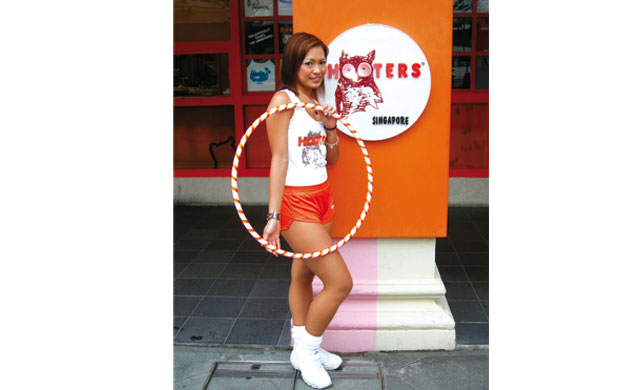 What did you think when you saw this uniform for the first time?
What did you think when you saw this uniform for the first time?
I was thinking to myself, “Oh my god, the uniform is so teeny-weeny!” But after I got used to it, I find it kinda cool donning this sporty uniform for work. It’s not an attire that just anyone can pull off!
How did you feel when you wore it the first time?
I didn’t feel confident the first time. It wasn’t until I received compliments from colleagues and guests that I began to feel proud of my uniform. Some of the compliments actually came from ladies!
What do you like about it?
It’s definitely a uniform that screams “Hey, look at me!” But on top of that, I like the sporty cut. Also, it helps me watch my weight.
What don’t you like about it?
People who’re not used to our uniform might have the idea that we are scantily clad waitresses, but the image we’re portraying is actually that of sporty cheerleaders.
Do you ever wear your uniform outside of the office?
We are not allowed to wear the uniform out of Hooters. We have to maintain the exclusivity …
Are you proud of what you do?
I’m definitely proud of what I do. To be a Hooters Girl, you’ve got to have what it takes. The number one criteria is personality.
What else do you wear when you work?
Apart from our spandex and shorts, we wear white sports shoes with white socks, and of course not forgetting our million-dollar smiles!
THE HOST
Paul Ramesh, Assistant Customer Service Manager, Front-of-House at Esplanade—Theatres on the Bay
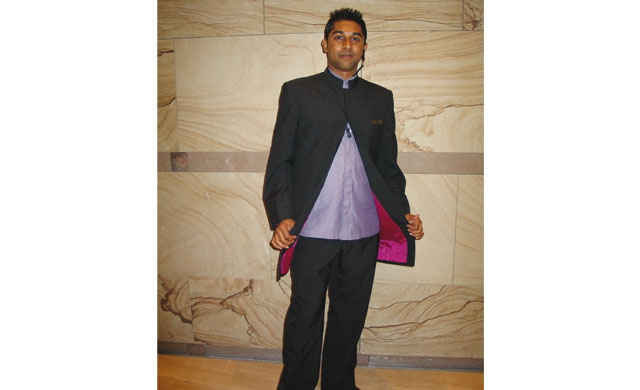
What did you feel when you wore it the first time?
I felt a real sense of pride to be wearing something that identified me so closely with Esplanade. This uniform makes you look smart, and stand taller.
What do you like about it?
It makes anyone look smart! But it’s also very comfortable. It’s easy to move about in, which is important because we walk around a lot.
Are you proud of what you do?
Yes. We’re in the frontline at Esplanade, dealing with customers, helping them feel welcome, doing whatever we can to make sure their experience is the best possible.
Do you have to buy it, or is it supplied?
It’s supplied.
How often do you wash it?
Every time it’s used! It’s a question of hygiene.
THE WELCOMING COMMITTEE
Raymond Paul, Hotel Host at The Scarlet
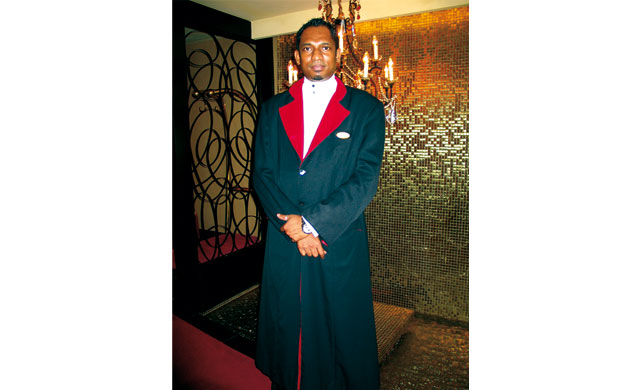
What did you think when you saw this uniform for the first time?
I liked it. It’s unique—in terms of color and texture. It blends in with the hotel.
How did you feel when you wore it the first time?
It’s heavy, it takes some getting used to.
What do you like about it?
It goes with my height.
What don’t you like about it?
It gets a bit warm when I go outside, but otherwise it’s perfect.
Do you have to buy it, or is it supplied?
The hotel supplies it. It’s tailored in London by a London-based designer.
Do you feel proud when you wear it?
Yes! Of course! 101 percent. I feel great. I feel part of the hotel, very bohemian.
THE SCHOOLBOY
Bryan Tan, pre-schooler at The Moral Childcare Centre
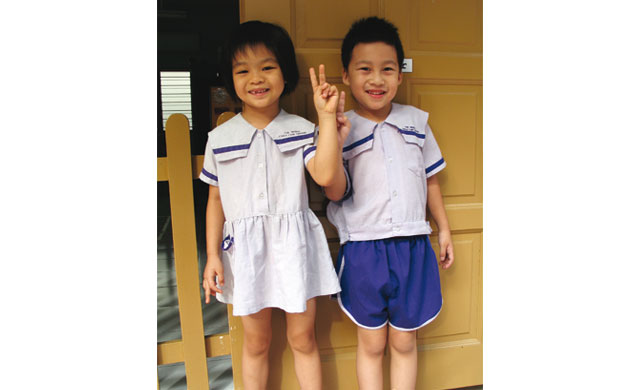
What do you think of your uniform, do you like it?
Yes, I like it.
Do you ever wear your uniform outside of school?
No, only in school.
How often do you wash it?
Mum: As they play in the playground every day, it gets quite sweaty, so I wash it every day.
What did you feel when you wear it?
I feel happy.
FLIPPERS FRIEND
Low San San, Marine Mammal Trainee at Underwater World Singapore
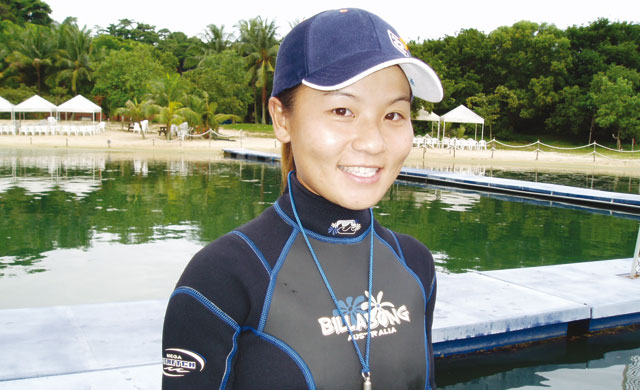
What did you think when you saw the uniform for the first time?
My first impression was that it looked very sporty, presentable, vibrant and professional.
How did you feel when you wore it for the first time?
I felt part of the dolphin trainer family. As for the uniform itself, I found it very comfortable.
What do you like about it?
It keeps me warm, during cold weather. Best of all, it protects my skin from UV sunlight.
What don’t you like about it?
It can be too warm for super hot days, especially if I have to work on the beach!
Are you proud of what you do?
Definitely! I enjoy every single moment!
What else do you wear when you work?
I wear a lycra top and board shorts for the dolphin shows and the company’s polo shirt for the rest of the day.
Do you have to buy it, or is it supplied?
All our uniforms are sponsored by Billabong and Crocs footwear.
How often do you wash it?
I rinse my uniform with fresh water after every show, and wash it at the end of the day.
THE DELIVERY MAN
Suhaimi Abdul Rahman, courier with DHL

What did you think when you saw this uniform for the first time?
I like it. It has vibrant colors, is comfortable, long lasting and has special features such as cargo pockets, adjustable waistbands and reflector stripes, which help make my work safer and more comfortable.
How did you feel when you wore it for the first time?
Great! It looks cool and feels cool. The material is thinner and more breathable. I was told our uniforms had undergone many tests to help to minimize skin irritations.
What did you like about it?
I like the red and yellow colors, which make us stand out from the crowd. They also go well with the navy blue pants. We all played a part in the design of the uniform, as employee feedback was sought before it was launched.
Do you wear the uniform outside the office?
For security reasons, we wear our uniforms only during office hours.
Are you proud of what you do?
Yes. Even after 14 years, my job is still very challenging. It is not easy to locate some “ulu” place or to deliver a parcel when the lift is out of order. My daily goal is to ensure that the deliveries arrive safely and on time and nothing beats seeing a smile on a customer’s face.
How often do you wash it?
Every day! I want to ensure that I look smart and clean when I meet customers.
THE COFFEE PRINCESS
Ng Cai Lin, waitress at Olio Dôme
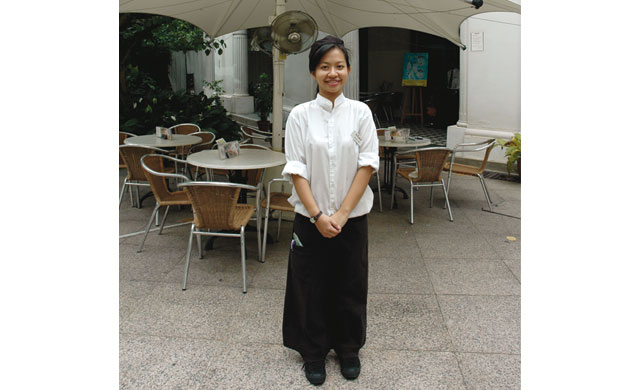
How did you feel when you wore it the first time?
It’s a little too big for me, even size S doesn’t fit me, but it’s ok.
What do you like about it?
The logo at the back is special as it is embroidered and is really colorful.
Are you proud of what you do?
Yes, it’s fun really, when you bond with your colleagues and see regulars coming to ask for their usual breakfast. And they recognize you!
Is there anyone else’s uniform you really want to wear?
Probably the SIA sarong kebaya, it’s a Singaporean girl’s dream.
What are the pros and cons of your uniform?
Stains are hard to get rid of because it’s white, but the uniform is otherwise comfortable. And it keeps you warm too, as it has long sleeves. My friends really like the beret because it looks smart.
LATTE LADY
Rohani Bte Abd Rahman, barista at Starbucks

What did you think when you saw the uniform for the first time?
The green apron was the first thing that caught my eye. It’s bright and different from the other cafes’.
How did you feel when you wore it for the first time?
I was eager and proud to put on the apron. It gave me a sense of belonging and I was honored to be part of the team. I had always wanted to work in Starbucks Coffee.
What do you like about it?
I love the green! Green represents peace!
Do you ever wear your uniform outside of the office?
Yes, I wear the T-shirt. Customers have asked for the T-shirts. We even have one T-shirt designed by our very own barista (Starbucks employee).
Are you proud of what you do?
Yes. I have been with Starbucks for five years. I love meeting regular customers, who are now my friends. It’s always interesting to get to know new customers and become a part of their lives.
Is there anyone else’s uniform you really want to wear?
If I were not a Starbucks partner, I would really want to wear a nurse’s uniform.
What are the pros and cons of your uniform?
I look good in it and it makes me feel great! I can’t wear it all the time ... only on shifts, when I’m working.
THE BALLOON GIRL
Vivien Goh, Sweetheart the clown
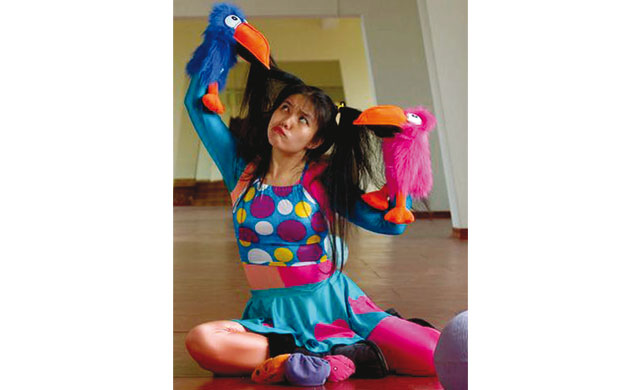
What did you think when you saw this uniform for the first time?
I was very happy, because I finally got to see what it would look like, translated from a design that I drew.
How did you feel when you wore it the first time?
Transformed, like Wonder Woman, with special powers to affect the lives of people. For me, I felt like I had the power to make someone happy!
What do you like about it?
The colors and the fact that it is cool when the weather is warm, and warm when the environment is cold.
What don’t you like about it?
If I get fat, everything shows too easily.
Do you ever wear your uniform outside of the office?
All the time, I’ve even been on a bus with the outfit on when I couldn’t find a cab! I’m usually dressed before and after the parties that I go to, so the kids will never see me without my costume.
Are you proud of what you do?
Definitely! I feel very blessed to be able to do this professionally.
What else do you wear when you work?
Two ponytails tied high, and of course, the proper innerwear ... everything is smooooooooth so the innerwear has got to be smooth too, else it looks bumpy.
Is there anyone else’s uniform you really want to wear?
I’ve always wanted to try on a real astronaut’s uniform and try floating around in zero gravity.
What are the pros and cons of your uniform?
I have to change the whole set once every six months or so, because the color fades. The best part is, it is really comfortable and feels like a second skin.
What do people call you when they see you in uniform?
Hi Clown.... or “she’s the balloon girl!”
Do you have to buy it, or is it supplied?
It is custom made by my costume maker.
How often do you wash it?
After each and every use, because I perspire a lot during my show!
THE SINGAPORE GIRL
Francine Wan, ex-SIA Girl
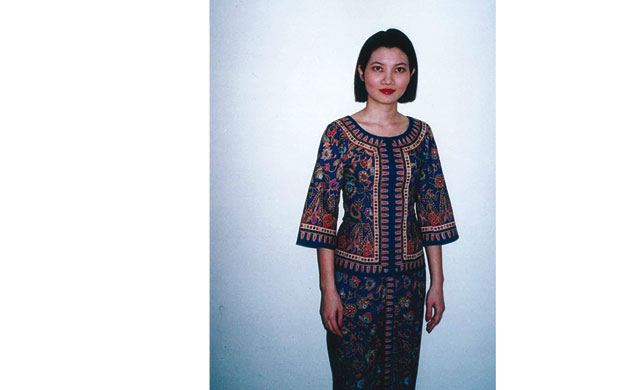
What did you think when you saw the uniform for the first time?
I thought it was gorgeous! In fact, I think it should be our national costume.
What did you like about it?
It’s more resilient than it looks. It’s crease-proof, spill-proof and (sometimes) rip-proof.
What didn’t you like about it?
I couldn’t eat as much as I would’ve liked to in most countries. A warning is given to any girl who puts on weight. They’ll ground you. Excess baggage doesn’t just apply to the luggage.
Did you ever wear your uniform outside of the office?
There is a strict rule about that. Wearing it out is only permitted to and from the airport and hotel. Anywhere else is a big no.
Are you proud of what you do?
Yes, I was very proud. The uniform had a way of making you feel proud ... although all we did was serve people.
What else do you wear when you work?
Special underwear to ease the pressure on board. They recommend wearing girdles to keep everything in its place and for future mums to protect their fragile wombs.
Is there anyone else’s uniform you really want to wear?
A nun’s habit. I would like to try walking around in it for a day and then go clubbing to see how people respond to me.
What do people call you when they see you in uniform?
Nothing. They just looked to see if I’m really pretty or not. Foreigners asked for pictures to be taken with them.
Do you have to buy it, or is it supplied?
It was supplied. They have a special tailor.
If bought, where?
You can’t buy it, but you can get imitations at all trusted souvenir stores.
WILD CHILD
Sim Hui, Wild Discoverer Guide at Singapore Zoo
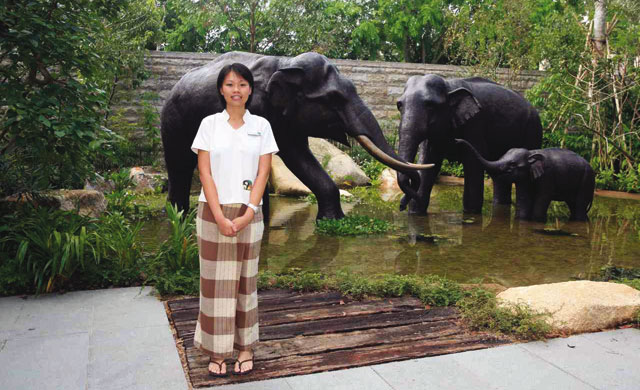
What did you think when you saw this uniform for the first time?
It is really unique and different.
How did you feel when you wore it for the first time?
It felt weird the first time I wore it, because it is nothing common or similar to my daily dressing. But after some time, I felt comfortable wearing them, and in fact do feel good wearing them.
What do you like about it?
It looks unique and different from the many types of uniform out in the market. Many guest had commented that they like our pants. Some even enquired if they could purchase the pants from us.
What don’t you like about it?
Because of the additional flap of cloth in front of the pants, it can be quite cumbersome if I need to move around faster. But the flap was to make us look more feminine.
Are you proud of what you do?
Yes, of course I am proud of what I do. It gives me a great sense of satisfaction when I see a guest going home happy.
What else do you wear when you work?
The other form of uniform, which is a white Polo T-shirt and black cargo pants. I wear that when I have to go round the park constantly.
























 What did you think when you saw this uniform for the first time?
What did you think when you saw this uniform for the first time?








